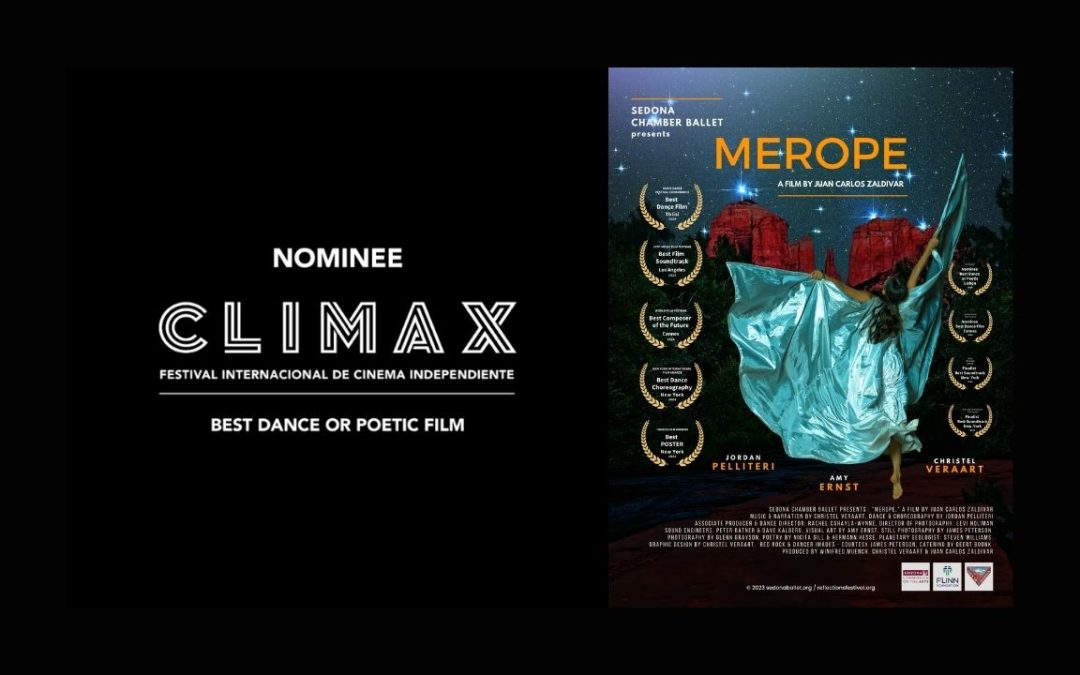Back in January, when the hustle and bustle of the new year had us all too busy to notice, we received a thoughtful message from Roberto Santos, the head of submissions for the CLIMAX Festival Internacional de Cinema Independiente Madrid. To our delight, our short film Merope was selected as one of the standout finalists in their 2024 online winter edition! In addition, Roberto Santos wrote us a glowing academic essay to complement our film (see below).

Jordan Pelliteri, Photo by James Peterson
We’re proud to share this beautiful tribute to Merope, which we believe adds another layer of appreciation to the film’s artistic journey. For the purpose of this blogpost, we took the liberty to add links.
Out of a remarkable 429 submissions, Roberto shared that Merope had made it onto the exclusive list of 92 finalists. We couldn’t be more thrilled to be recognized among such talented filmmakers.
CLIMAX – Festival Internacional de Cine Independiente – Madrid (Spain)
According to their website, “CLIMAX is a unique virtual Film Festival, distinguished itself as and “art gallery” for cinematic works. Streamed annually, CLIMAX uniquely positions itself at the intersection of art and innovation, drawing films that pulsate with originality, complexity, and a distinctive narrative subtext, CLIMAX hold a magnifying glass over works that employ unconventional methodologies and facets of cinematic expression, eagerly searching for the elusive “X-factor”.”
Celestial Phenomenology: Embodied Mythopoesis and Performative Transcendence in Experimental Cinema
— Review by Roberto Santos – Climax
In Juan Carlos Zaldivar‘s experimental short *Merope* (2023), we witness an ambitious synthesis of dance, music, and cosmic mythology that exists in dialogue with contemporary experimental cinema’s preoccupation with embodied experience and mythological recontextualisation. The film’s treatment of its celestial subject matter recalls the astral ruminations of Terrence Malick’s *The Tree of Life* (2011) while its dance sequences, particularly those captured in silhouette, echo the corporeal expressionism of Gaspar Noé’s *Climax* (2018) and the ritualistic movement studies of Maya Deren’s *At Land* (1944).
Through its interweaving of Christel Veraart‘s haunting score—which oscillates between biblical gravitas and ethereal minimalism—and Jordan Pelliteri‘s embodied interpretation of the titular star, the film constructs what Laura Mulvey might term a “celestial gaze,” simultaneously objectifying and emancipating the feminine cosmic body. The aerial cinematography, while occasionally betraying its modest budget, achieves moments of genuine transcendence, particularly in sequences where the dancer’s form becomes abstracted against Sedona‘s natural canvas, recalling the metaphysical landscapes of Carlos Reygadas‘ *Silent Light* (2007) and the recent work of Apichatpong Weerasethakul in *Memoria* (2021).
The film’s most compelling achievement lies in its anthropomorphisation of astronomical phenomena, a strategy that places it within a lineage of experimental works concerned with the intersection of human and cosmic experience, from Jordan Belson’s *Allures* (1961) to Lucrecia Martel’s *Zama” (2017). Particularly striking is a nocturnal sequence where Pelliteri’s movement vocabulary, illuminated only by starlight, creates a dialectical relationship between terrestrial embodiment and celestial abstraction. This moment exemplifies what Gilles Deleuze would identify as the “time-image“—a direct representation of time itself through the medium of human movement.
The narration, layered with Veraart’s vocal performances, constructs a complex audiovisual palimpsest that challenges traditional narrative structures while engaging with contemporary discourse around female agency and visibility in mythological narratives. This approach aligns with recent experimental works like Céline Sciamma’s *Petite Maman* (2021) and Alice Rohrwacher’s *Happy as Lazzaro* (2018), which similarly interrogate traditional storytelling through a feminist lens. The film’s deliberate resistance to mainstream cinematic conventions—its embrace of the “random” and the poetic—positions it within the vital tradition of avant-garde cinema that privileges experiential immersion over narrative coherence.
In its brief eight minutes, *Merope* achieves what Kristeva would term “semiotic chora”—a pre-linguistic space of possibility where meaning emerges through rhythm, movement, and sound rather than traditional signification. While the film’s experimental nature may indeed alienate mainstream audiences, its synthesis of dance, music, and mythology creates a deeply affecting meditation on visibility, embodiment, and cosmic interconnection. The work stands as a testament to the continuing vitality of experimental cinema in exploring the boundaries between the physical and the metaphysical, the personal and the universal.
Thank you to Roberto Santos and the entire CLIMAX Festival team for this recognition. We look forward to the continued celebration of independent cinema and all the amazing work that was submitted!

